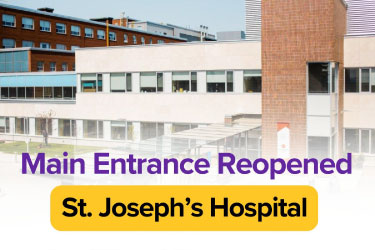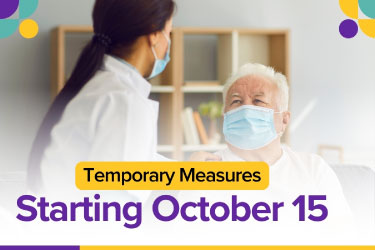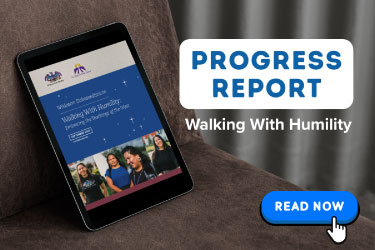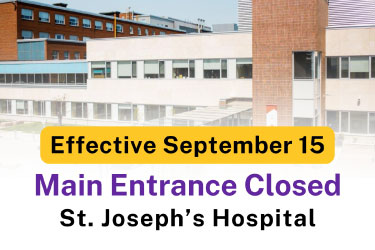Staff Resources
WSIB Work Related Injuries
If this is an absence from work due to a non-work related illness or injury, please go to the Short-Term Disability & Benefits page under the Employee Portal Page.
Return to Work Program
St. Joseph's Care Group offers Early and Safe Return to Work (ESRTW) - formerly called Modified Work.
The goal of the Early and Safe Return to Work program is to return injured employees to work safely.
Most workers are able to perform some type of work even while they may still be recovering from an injury or illness. Returning to daily work and life activities helps employees in the recovery process. The longer an employee is off work due to injury or illness, the more difficult it is to re-orientate that employee back into the workplace.
Both St. Joseph's Care Group and its employees benefit by cooperating in the Early and Safe Return to Work (ESRTW) program. Employees benefit by restoring their source of income, and staying active and productive, both of which are important to the healing/recovery process. St. Joseph’s Care Group benefits by retaining valuable and knowledgeable people who contribute to the organization's overall operational efficiency for the betterment of clients.
WSIB Forms
- Workplace Safety and Insurance Board website
- Functional Abilities Form (for WSIB Work Related Injuries)
Responsibility of the Employee
If a worker is injured or ill due to an incident at work, the following process must be followed:
Step #1 - Ensure appropriate first aid or health care has been sought immediately if required.
Step #2 - Inform your Supervisor and complete an employee incident report if one has not already been submitted. Print the Functional Abilities Form (FAF). This form is required if medical attention is sought, or if there is potential that "modified duties" may be required. Bring the FAF to your treating health care practitioner (i.e. Doctor, chiropractor, physio) and return to your supervisor before your next scheduled shift if possible. If not possible, call your supervisor to inform of any restrictions and to discuss modified work.
Step #3 - Contact your supervisor to discuss suitable modified duties as soon as possible and prior to your next scheduled shift. These duties may be different than your regular work if necessary. Initial modified duties if required may be sedentary in nature. Sedentary Work is that which is less than 10 lbs. of lifting, and has minimal walking or standing, with the ability to change positions as required. Examples of sedentary work may include: completing mandatory education modules; review of accident with manager, desk type duties, assist feeding, vitals - if clinical etc.
Step #4 - Participate in the Return to work plan. If you are totally disabled from work, and unable to perform any modified work, please ensure you obtain medical treatment and that documentation is provided to the WSIB
The Workplace Safety & Insurance Board (WSIB)
Worker Responsibilities - Return to Work?
- Get proper medical treatment immediately following a work-related injury or illness and follow the recommendation of your health care providers.
- Report your injury to your employer as soon as possible.
- Contact your employer as soon as possible after the injury or illness occurs. Stay in contact with your employer throughout your recovery, to keep company informed about your progress and status. (For you own benefit, keep a record of those contacts).
- Help your employer identify suitable work that is available, that is consistent with your functional abilities, and that restores pre-injury earnings when possible.
- Give your case manager or nurse consultant any information requested concerning your return to work.
- Report any significant change in your medical condition or income that may affect your benefits (also called a “material change”). If you are in doubt about whether a change is material, contact your case manager. You must report any material change in your status within 10 days of the change occurring. Significant changes include:
- Returning to work
- Beginning to receive other income or government benefits
- Significant changes in your medical condition
- Cooperate with your employer and the WSIB in your early and safe return to work.
Respiratory Protection (Fit Testing)
With the emergence of novel infectious respiratory diseases such as SARS (severe acute respiratory syndrome) and H1N1 in the past; and with the prospect of pandemic influenza raising a concern for the future, St. Joseph’s Care Group along with other organizations have made the development and implementation of the respiratory protection program a priority. Exposure to air contaminated by chemical and biological agents is an occupational hazard. Therefore, respiratory protection, along with other control strategies, is necessary for the protection of employees, clients, residents and visitors.
Employees are required to be Fit Tested every two years by attending a Fit Testing session with a certified Fit Tester. St. Joseph’s Care Group has Fit Testers available with Fit Testing sessions scheduled regularly at various times and locations throughout the organization.
For more information on Fit Testing, or if you would like to attend a Fit Testing session, please call Occupational Safety & WSIB department at (807) 343-4330.
-- Updated: September 24, 2018 --







